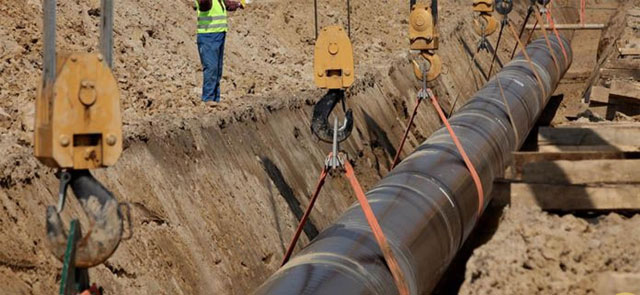
COMMENT | Joseph Mukasa Ngubwagye | Preparations to start the construction of the East African Crude Oil Pipeline (EACOP), the world’s longest heated pipeline, are in high gear. The all-important tripartite agreements between the project developers and the governments of Uganda and Tanzania were signed in the first half of this year, paving way for the engineering, procurement, and construction processes for the project.
The agreements include the Host Government Agreement (HGA), the Tariff and Transportation Agreement (TTA), and the Share Holding Agreement (SHA). Media reports have quoted the EACOP General Manager Martin Tiffen saying that construction is likely to start in September 2021.
In Uganda, the EACOP traverses the districts of Kikuube, Hoima, Kakumiro, Kyankwanzi, Mubende, Gomba, Ssembabule, Lwengo, Kyotera and Rakai.
Government took over the acquisition of land for the project in public interest, and this resulted in involuntary physical and economic displacement of persons and communities. As required by law, these were meant to be compensated for their land and any other properties affected.
Nonetheless, issues of under valuation and delayed compensation have dominated the land acquisition process for the project. For example, since 2018 the affected persons have never received their compensation. As a result, several other social and economic concerns have come up. Whereas government is considering a 15 percent increment in the value for their properties to cater for the delay, grievances have largely defined the EACOP so far.
Unfortunately, this might have obstructed the host communities from the opportunities of the EACOP especially during construction. It is expected that the EACOP will create about 9,500 indirect, direct and/or induced jobs valued at 57.1 billion shillings.
It is equally projected that about 142.3 billion shillings will be spent on the purchase of goods and services for the project, some of which will be food for the huge workforce. Organized host communities would partake of these economic opportunities.
Effort has been made by government and oil companies to train some youths in welding so that they are able to work on the pipeline. Nonetheless, host communities remain largely uninformed, ill-equipped and unprepared to meaningfully tap into the economic benefits of constructing the pipeline.
It is even worse that the District Local Government technical and political leaders have been sidelined in planning for the EACOP project, as documented in a study report by the Civil Society Coalition on Oil and Gas (CSCO). These would have been instrumental in passing on important information about the opportunities expected, and helping communities organize themselves to benefit from them.
Oil and gas operations can and should contribute to improving the livelihoods of communities living in project areas by promoting the sustainable development of the often-marginalized regions where the projects are typically located. Local developmental impacts of oil and gas developments through backward linkages with the local economy by generating local employment, transferring knowledge, and outsourcing inputs locally are very critical.
The central government and local governments have a big role to play, and any form of information asymmetry between the two can only affect local development negatively. Indeed, in other jurisdictions, local governments from host regions have been demanding from the central government a bigger role in influencing decisions with regard to planning for revenue from oil and gas projects.
Sub-national governments should be entitled to economic benefits from big projects like the EACOP in compensation for the social, environmental and infrastructure costs of hosting oil and gas projects in their territories.
Going forward, the role of Local Governments in the planning for the EACOP and the wider oil and gas sector must be strengthened if they are to spur local development for the benefit of host communities.
Awareness campaigns on the opportunities of EACOP during construction should be improved and sustained; and efforts to prepare the host communities in form of improving their employability and quality of local products and services should be increased. This can be achieved if the Ministry of Energy and Economic Development and the Petroleum Authority of Uganda work collaboratively with District Local Governments.
*****
 Joseph Mukasa Ngubwagye is a a Senior Research Fellow, Oil Governance and Environmental Sustainability in Uganda (OGESU) Project Advocates Coalition for Development and Environment (ACODE)jngubwagye@acode-u.org
Joseph Mukasa Ngubwagye is a a Senior Research Fellow, Oil Governance and Environmental Sustainability in Uganda (OGESU) Project Advocates Coalition for Development and Environment (ACODE)jngubwagye@acode-u.org
 The Independent Uganda: You get the Truth we Pay the Price
The Independent Uganda: You get the Truth we Pay the Price



The government of Uganda we are missing this out. How long will oil and gas last in our country perharps its for a short period . why cant we basically be mindful of what will come after the EACOP project . our environment will not be there any more , there will be increased negative impacts of climate change which will lead to prolonged drought, heavy rainfall , floods leading to food insecurities hence causing death. its therefore important to not temporary jobs to the youth in EACOP project rather emphasizing and encouraging the youth to participate in promoting green economy that will last for ages and providing them with sustainable green job than running for the short run projects . This project has affected alot of persons, communities , infrastructure among others while oil companies and our government keep giving false hopes of compesation to the affected persons .
Alot has to be done to protect our environment from destruction of oil curse
Dear Ireen, I find your comments extremely satisfying. Highlighting the why, the how, the where, the what and the OIL CURSE Paradox, I say to you “A Luta Continua”
Well done Independent on Uganda’s Oil and Gas for many years. My 2018 “21 Commandments of OIL” start with :
Commandment XXI : Thou shalt stand warned
“In this 21st century, as hast manifested other where, as thou sees’ now, furthering on…thou shalt shudder: Petroleum shalt wreak dilapidation upon us…True…True… Petroleum is Satan’s Feculence. CureOilCurse is do or die.”
V. Thou shalt Safeguard, always, Peoples’ land, water and air; the fauna, the flora, the biodiversity, against human grabbing, pollution, and destruction throughout the Petroleum value-chain; thence
ensuring Regeneration and Human Security.
VI. Thou shalt Drive the Petroleum sector to grow and build strong and sustainable Host Community, Local and National Content
Development with requisite science education, technology, capacity, businesses, competences, and bank financing.
Uganda’s Long Oil Journey has not produced First Oil….Many Organizations have decampaigned EACOP…
“Bullet-less COVID World War III has been supplanted in 2022 by Bombful World War IV”..